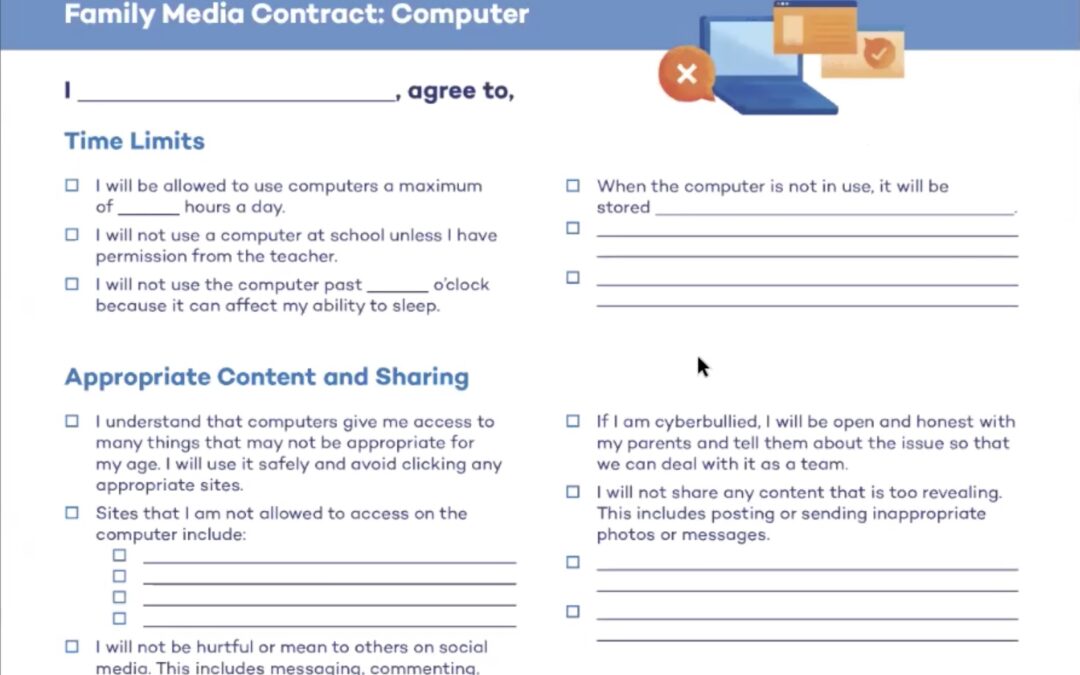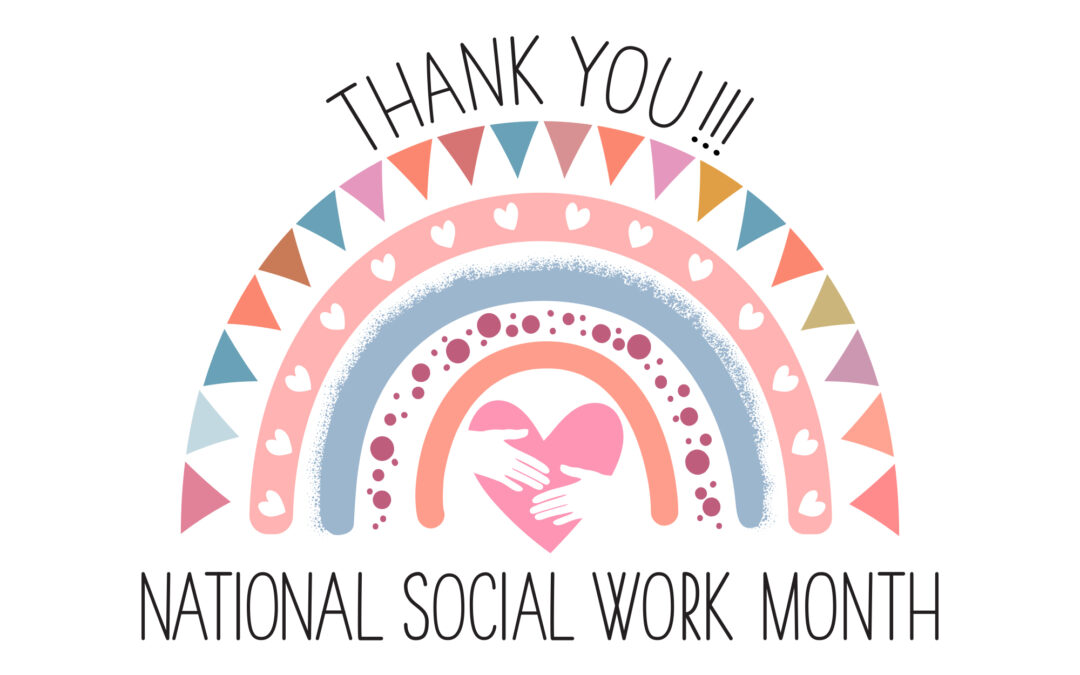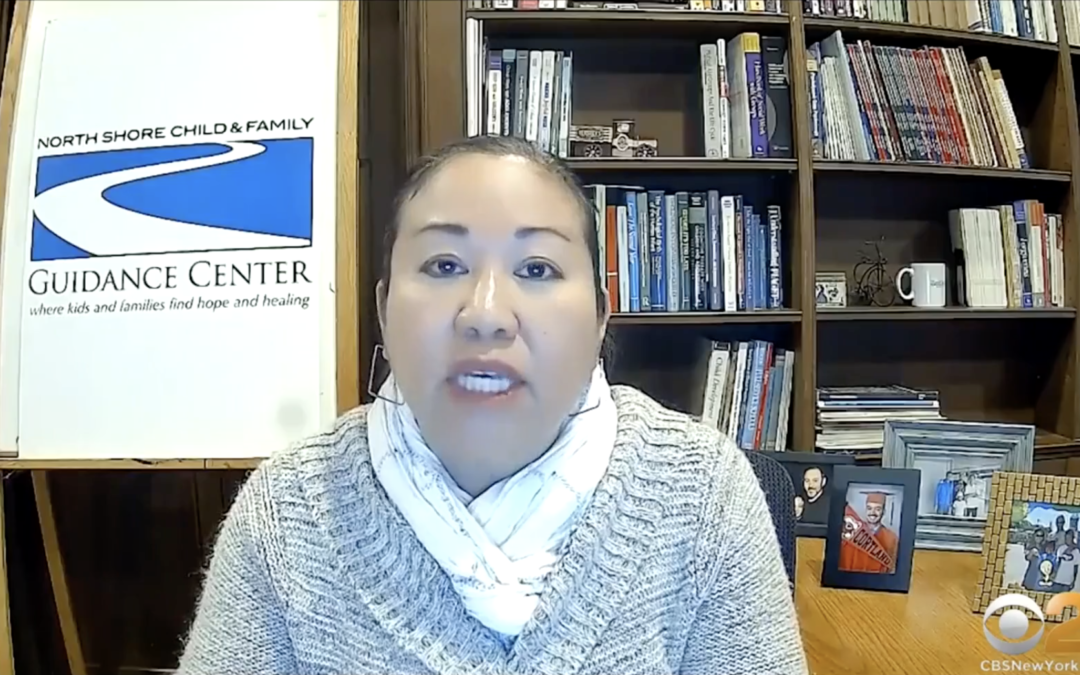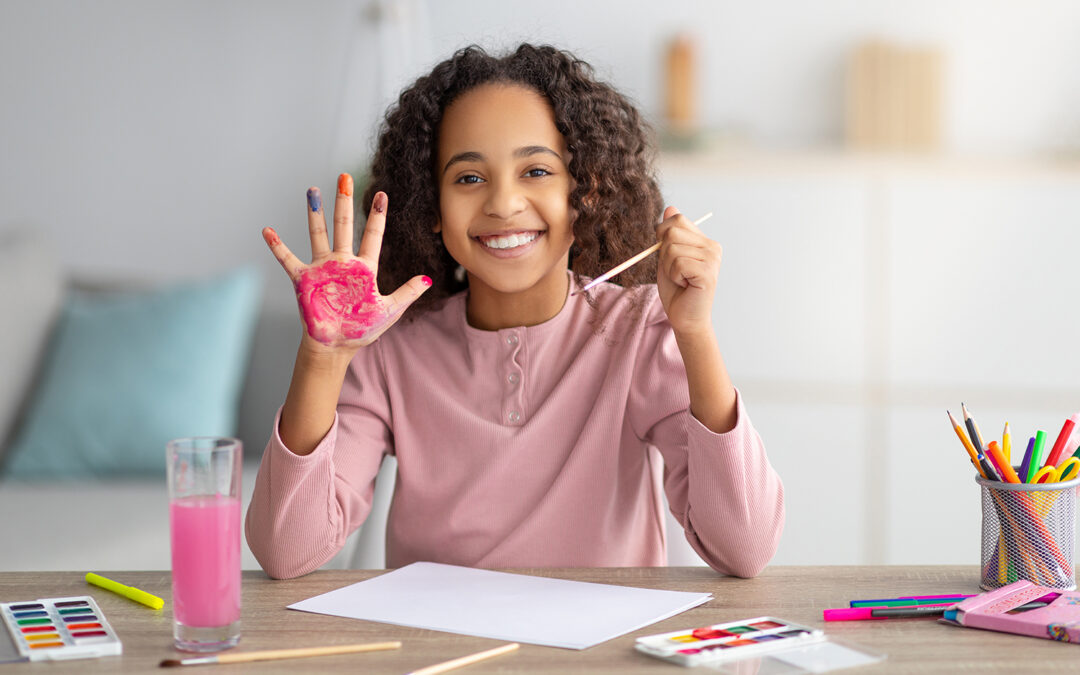


Celebrating Our Healers!
March is National Social Work Month, and today happens to be World Social Work Day! Every day of the year, we are proud of the dedicated staff at North Shore Child & Family Guidance Center, which consists of social workers, mental health counselors, psychologists, psychiatrists and other mental health professionals, all of whom work to bring hope and healing to the children and families in our community – more important than ever during the pandemic, which has created a true mental health crisis.
Here, some of our staff members give insight into their chosen careers:
“I like to say that the social work profession actually chose me instead of the other way around. Through my own personal experiences with trauma, abuse and neglect, I needed to find a way to heal and experience an inner serenity. The social work profession has given me the tools to help combat and overcome many challenges throughout my life. I enjoy being able to help others, and it was clear to me early on in my career that changing the world starts with helping one person and being able to empathize with them. I have been in their shoes. North Shore Child & Family Guidance Center is a place of hope and healing for so many of our children and families. That’s the reason I am here and love to do what I do.”
Kathy Rivera, LCSW, Executive Director/CEO
“Although I’ve known this for a long time, the past few years have reinforced that social workers are the most dedicated, selfless and courageous people out there. Social workers get the job done. They show up day after day providing guidance, hope and support to others, often with the thought of wishing they could do more. And while social work practice is undervalued in society, social workers aren’t doing this work for acknowledgement or compensation. They recognize that making a difference for one child or family is important enough to keep going. I am grateful to be part of a team of compassionate, talented clinicians and hope that we continue to show the world who we are and what we do. Happy Social Work Month!
Vanessa McMullan LCSW
“My primary mission in choosing my career path was to try to enhance people’s well-being with particular attention to the needs and empowerment of those who are vulnerable, disenfranchised, oppressed or at risk. I have a personal and professional passion for working with at-risk youth and those in need, helping them find their strengths and ways of looking at the world from a different lens and showing them ways of being that they may have never thought were possible.”
“Dee” Nendler Michel, LCSW
“I am a licensed psychologist back home in Venezuela, and when I immigrated to the United States, I decided to rebuild my career and became a social worker. Working with children and families has been my passion in the past 20 years. I strongly believe that intervening in families creates a better foundation for societies. Working with Spanish-speaking children and their families ensures a better future for this community, my community.”
Erika Perez-Tobon, LMSW
“I always knew I wanted to help others, and while I was going through the college application process, I decided to study psychology as an undergraduate. While there, I spoke with professors and completed an internship in the mental health field. Ever since then, I knew this was the career for me. So many children and families are in need of assistance and are doing the most they can for support. It has become my pleasure to work with and advocate for these children and families.”
Paul Danilack, LMHC
“Adolescence is a time of great change, both emotionally and physically. I have always been fascinated about how this turmoil eventually gives way to adulthood. There are many detours along the way, and oftentimes youngsters need help ‘steering their ship’ or even preventing it from ‘capsizing.’ I very much enjoy being part of this journey. Having once been an adolescent myself (some would say I am still one!) I feel I have a lot to offer in easing pain, perspective and support. I enjoy helping to turn chaos into harmony and the valuable lessons that I learn from interactions with my young patients.”
Dr. Jolie Pataki
“I chose to be a social worker because I was lucky enough to be raised by one! My mom, who has been a clinical social worker for over 35 years, always said to me, ‘You are such a natural social worker!’ As it became time to choose colleges, I had already known in my heart that social work was what I wanted to do for my career. This is not, nor has it ever been, simply a job or career for me. This has been my passion. Putting a passion and a career together is a uniquely beautiful thing. I always wanted to help. I always want people to feel safe, heard, respected and validated. I always wanted to help people find their voices.
It has been truly rewarding to work with children and their families because you get to watch them grow. You get to be a part of their story. You get to help them in their most vulnerable moments, which I feel are the moments that show the most strength. They allow you into their lives in such a unique way. When clients learn their own strengths (that you saw from the moment you first interacted with them), that is why it is so rewarding. The human connection and allowing their pain to be kept safe with you is an honor.
Starting as an intern, now being a Clinical Supervisor of this agency, with our mission being ‘restoring and strengthening the emotional well-being of children and families’ is truly rewarding.”
Gillian Uhl, LMSW
“I got into social work due to my mom being a social worker. I grew up in a multicultural home as she was a host mom to international students through the University of South Carolina at the time. I learned early on that helping others was a part of life and only enriches your life. I also remember telling my mom while I was in graduate school that I don’t need a degree to help people.
Now that I am in the profession for three years, I have been able to grow my skills and see the potential that this profession has. The experiences I have had at the Guidance Center have set me up for anything the world has to offer. I know its cliché, but I really feel like I have saved lives doing what I do. Being in the drug and alcohol program, you get to experience the lowest points of youth as they utilize substances to cope. To bring people out of that place so they can see the light within themselves to do better and be better is beyond words. Helping them learn to love themselves amid all the traumas they may have been through highlights their own ability to make it through anything. It is this part of the profession that keeps me going. Incorporating mindfulness practices such as meditation and deep breathing has been the cornerstone of my style. Incorporating them into garden therapy would be the next step in my journey and what I’m actively working toward.”
Ricardo Castillo, LMSW
My journey into the mental health field began with having a parent who was a middle school guidance counselor and was very attuned to addressing feelings. I always knew that this too was my passion and direction in life. For me, I enjoy working with a multidisciplinary team of outstanding dedicated professionals who all have a similar goal in mind, the health and well-being of children and their families. It’s very rewarding to work with families to shift to a more positive perspective for their child and see that child on a more successful path emotionally, behaviorally and educationally.
Sue Cohen, Ph.D.

How to Help Kids Cope with Daylight Savings Time, March 9, 2022


Ask the Guidance Center Experts
Published in Blank Slate Media, February 25, 2022
In this monthly column, therapists from North Shore Child & Family Guidance Center answer your questions on issues related to parenting, mental health and children’s well-being. To submit a question, email communications@northshorechildguidance.org.
Question: I have two daughters, 9 and 13 years old. While my youngest tends to approach life with a laid-back attitude, my older one has always been prone to anxiety. Even before the pandemic, she was having panic attacks, but they’ve gotten much worse in the past two years. I had hoped that the return to school and other “normal” activities would help, but it’s gotten so bad that she is avoiding social situations and spending most of her time in her room. How can I help her get over her anxiety?
–Parent Puzzled by Panic
Dear Parent Puzzled by Panic: Anxiety is a normal part of life, for both kids and adults. It would be difficult to find a child who, at some point, didn’t worry about monsters in the closet, or feel apprehensive on the first day of school. Moreover, the last two years have heightened feelings of anxiety for everyone, with the losses, fears and other difficult emotions that have arisen from the pandemic.
In most cases, children’s anxieties are eased with reassurance, love and comfort from an adult in their lives. But for some young people, anxiety is a constant companion. It is part of their everyday lives, and it can seriously impair their functioning. It can lead to debilitating panic attacks, which are characterized by symptoms such as shortness of breath, shaking, dizziness, heart racing and intense fear.
According to the National Institute of Mental Health, nearly a third of adolescents have an anxiety disorder, with about 8% suffering from severe impairment that leads to poor performance in school or missing school altogether; avoiding social situations; isolating; and/or using alcohol or drugs to mask the pain. They often feel alone and ashamed, and their anxiety can contribute to other conditions such as depression and eating disorders.
Studies show that during the COVID-19 pandemic, depression and anxiety in kids and teens doubled compared to pre-pandemic levels. One in 4 youth have significantly higher depression symptoms, while 1 in 5 are experiencing clinically elevated anxiety symptoms.
Although the cause of anxiety and panic attacks is varied, it can include a trauma, a divorce or death in the family or a physical illness. Plus, some people may be biologically predisposed to anxiety and panic attacks.
Here are some suggestions on how to help:
- Encourage your daughter to speak openly about her feelings. She needs to know that she isn’t at fault when she experiences symptoms of anxiety or panic.
- Assure her that, although she may feel she is crazy or is going to die, she is not in any danger.
- If she associates a certain place (such as school) with a panic attack, she may start avoiding that situation. Gentle, gradual exposure is essential, since continued avoidance only strengthens the pattern.
- News and social media can impact children much more than adults, causing them to feel unsafe in their environment, so it’s wise to monitor what your children are watching on TV and on social media.
- Make sure she eats healthy meals, gets enough sleep and exercises. Being physically healthy can lessen the effects of anxiety and panic.
Some other important steps to take include getting an evaluation from a medical professional to rule out any physical ailments that may contribute to anxiety.
The good news is that panic and anxiety disorders are very responsive to treatment, so contact a mental health agency or professional. Tell your daughter that seeing a therapist is a perfectly normal thing to do, and that many kids who experience anxiety are helped through therapy.
During the pandemic, North Shore Child & Family Guidance Center is seeing clients both remotely via telehealth platforms and in person, depending on the clients’ needs. To make an appointment, call 516-626-1971 or email intake@northshorechildguidance.org.

How the Arts Can Expand Your Child’s Horizons
By Guest Blogger Colleen Stewart
Children of all ages with mental health challenges and learning disabilities can benefit enormously from involvement in the arts. According to Scientific American, creative endeavors stimulate different parts of the brain than other forms of learning, which can create a positive environment for kids who have special considerations to contend with in terms of typical learning structures. When children and teens express themselves through the arts, whether it be painting, acting, music or other avenues, it can help lower stress and anxiety, improve self-esteem, moderate their moods, and create stronger relationships and social skills. In addition, it can have a positive impact on their academic life.
Below, you’ll find some information on how your child or teen can benefit from the arts and how to get them started.
How the Arts are Different
There’s a difference between painting a picture or molding clay and reading textbooks or performing mathematical calculations. According to a report by Americans for the Arts, children exposed to creativeendeavors perform better academically and have more advanced language skills than those who don’t. While children with learning disabilities do require assistive approaches to help them master traditional foundational educational concepts, incorporating the arts provides an environment in which they can feel good about their abilities and have something concrete they have control over. This can be especially helpful for teens, who go through so many changes in these pivotal years and often feel like they can’t control anything in the world around them.
Arts and Crafts at Home
If you have a teen with learning disabilities or mental health issues, ensuring you have plenty of arts and craft supplies at home can help them expand their imaginations with hands-on creative pursuits. You might allow for freeform activities or employ the use of online tutorials to encourage specific forms of artistic activity. Combining both structured and unstructured access to the arts can help your teen follow directions and step-by-step instructions, while still encouraging creativity.
Explore Different Types of Creative Pursuits
Involve your child in deciding what kinds of arts they’re most interested in. According to website Design Swan, there are a range of things you can do at home, including pottery, painting, jewelry making, watercolors and papercrafts. Teens may also be interested in taking classes in such media as oil painting, glasswork or ceramics. Check your local community art centers to learn about beginner classes that are available for young people. You might even consider joining them in the class! Not only can this be a fun bonding experience, but it will also give you greater insight into the way your child participates in a classroom environment and help you identify how you can help them manage their challenges.
The arts offer a great opportunity for teens with disabilities and mental health concerns of any kind find something they’re passionate about, develop a healthy outlet for expression, and even improve their academic performance. It’s a great way for them to develop their emotional health and set a strong foundation for making smart choices now and long into the future.
Bio: Colleen Stewart loves giving her two kids a healthy example to live by. Her passion for community and wellness inspired her and her husband to team up with their neighbors and create a playgroup that allows the adults and their kids to squeeze in a workout a few times a week. She created Playdate Fitness to help inspire other mamas and papas to make their well-being a priority, and set a healthy foundation for their little ones in the process.
